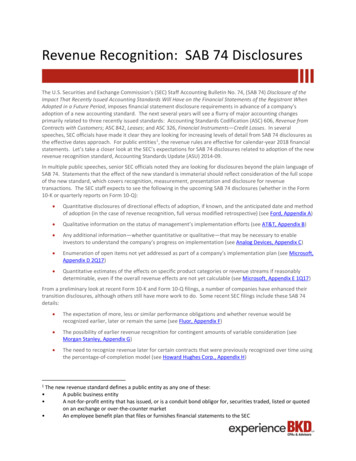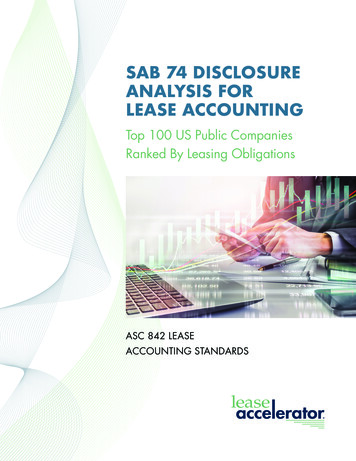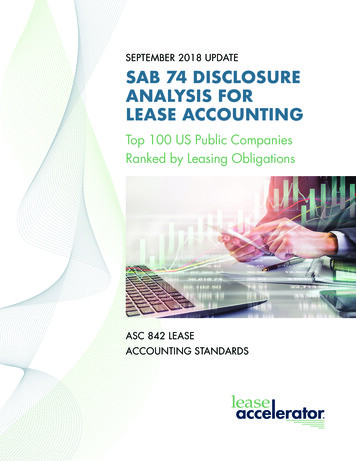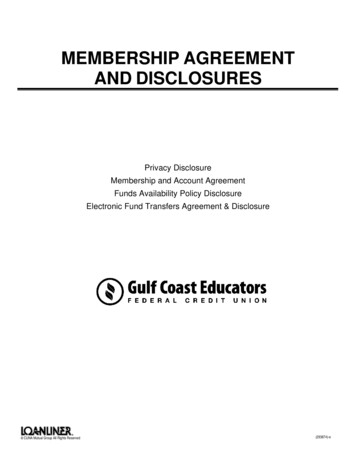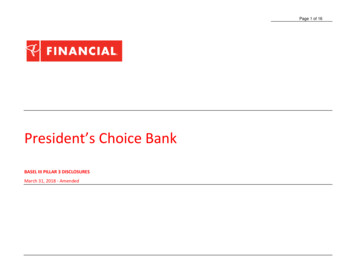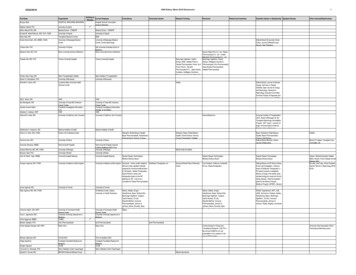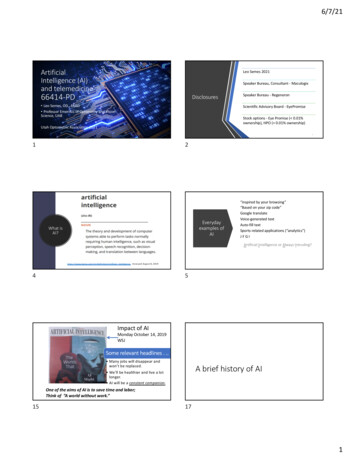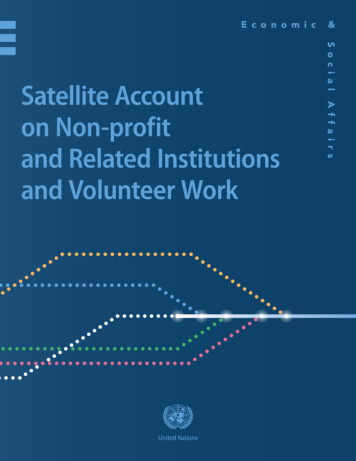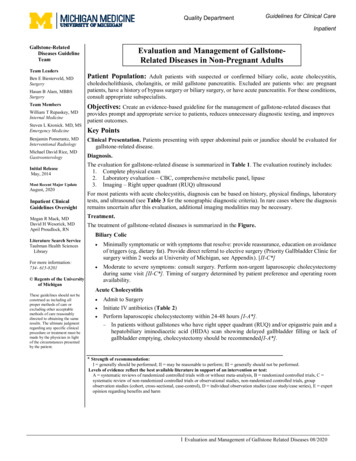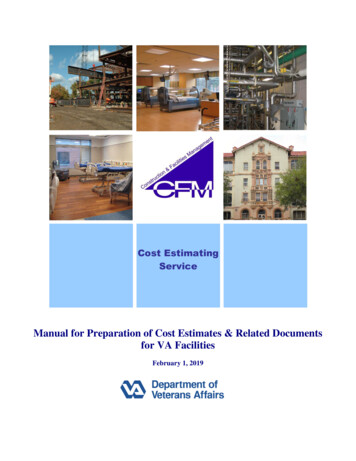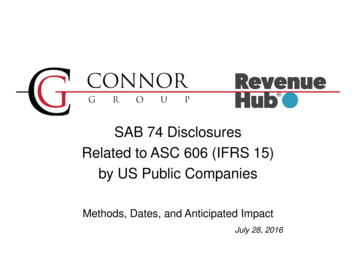
Transcription
SAB 74 DisclosuresRelated to ASC 606 (IFRS 15)by US Public CompaniesMethods, Dates, and Anticipated ImpactJuly 28, 2016 2016 Connor Group Silicon Valley San Francisco Salt Lake City New York Boston Europe ConnorGp.com1
Executive Summary This study was performed by Connor Group and RevenueHub to provide an overview of currentdisclosures made by US public companies regarding the upcoming adoption of ASC 606,Revenue from Contracts with Customers (or its IFRS equivalent, IFRS 15). The study was conducted in July 2016 based on SEC disclosures by 149 companies acrossvarious industries, and findings are relevant as of July 28, 2016. A summary of the findings is presented below. Almost 90% of the companies reviewed indicate that they are still in theprocess of assessment and, with a few exceptions, did not provide specificdisclosures regarding the impact of ASC 606 (IFRS 15) adoption. Just 4 companies of those reviewed have announced early adoption of the newstandard. Over 80% of the companies reviewed are currently not able to indicate whetherthey will use full retrospective or modified retrospective transition method. Theremaining companies have split approximately equally between the twomethods. 2016 Connor Group Silicon Valley San Francisco Salt Lake City New York Boston Europe ConnorGp.com2
Sampled Companies/MethodologyLarge Companies Market Cap 10Bn Form 10-Q Filed between 7/15/16 and7/28/16 Referred to “Revenue fromcontracts with Customers” 75 CompaniesOthers with RelevantDisclosures Form 10-K’s filed from2/1/16 to 7/27/16 Forms 10-Q, 8-K, 20-F filedfrom 5/1/16 to 7/27/16 Disclosed adoption date,method, or impact of thenew revenue standard 76 companiesNotes: 2 companies were found in both groups (total sample 149) 2016 Connor Group Silicon Valley San Francisco Salt Lake City New York Boston Europe ConnorGp.com3
Anticipated Adoption MethodCompaniesStill AssessingFull RetrospectiveModified Retrospective127/149(85%)12/149 (8%)10/149 (7%)Notable companies: Netflix Mondelez Dreamworks MicrosoftNotable companies: Edison Int. IBM Lennox Int. ASC 606 (IFRS 15) allow two adoption methods, full retrospective and modified retrospective. Under the full retrospective approach, entities recast all comparative periods presented in theirpost-adoption financial statements to comply with ASC 606 (IFRS 15). Under the modified retrospective approach, entities apply ASC 606 (IFRS 15) provisions to allrevenue transactions reported in their post-adoption financial statements. Under either approach, the cumulative effect of applying the new standard is recognized inretained earnings as of the beginning of the earlies period presented in accordance with ASC 606(IFRS 15). 2016 Connor Group Silicon Valley San Francisco Salt Lake City New York Boston Europe ConnorGp.com4
Anticipated Adoption DateCompaniesNot SpecifiedStandard(After Dec. 15, 2017)Early(After Dec. 15, 2016)71/149 (47%)74/149 (50%)4/149 (3%)Notable companies: IBM Dr. Pepper Snapple Sirius XM Philip Morris Netflix Visa Kellogg Company MicrosoftFordPuget Sound EnergyKibush Capital Corp US public companies are required to adopt ASC 606 (IFRS 15) no later than in fiscal yearsbeginning after December 15, 2017 (“standard” adoption date). They may also elect to adopt ASC 606 effective for fiscal years beginning after December 15,2016 (“early” adoption date). IFRS reporting companies may elect to adopt IFRS 15 for earlier periods. 2016 Connor Group Silicon Valley San Francisco Salt Lake City New York Boston Europe ConnorGp.com5
Anticipated ImpactCompaniesStill AssessingImmaterialMaterial133/149(89%)14 (10%)2 (1%)Notable companies Netflix Whirlpool Kimberly Clark O’Reilly Auto Chipotle Microsoft Syngenta AG (IFRS) SEC Staff Accounting Bulletin (SAB) 74 (Topic 11-M) requires US public companies to disclosethe impact of the adoption of recently issued accounting standards in their quarterly and annualfinancial statements. Most companies have made the initial disclosures that indicate the companies have not yetcompleted the assessment the adoption of ASC 606 (IFRS 15) will have on their financialstatements. The SEC staff has indicated that it expects these disclosures to evolve over time as companiesbegin to better understand how the standard will impact their financial statements. 2016 Connor Group Silicon Valley San Francisco Salt Lake City New York Boston Europe ConnorGp.com6
Adoption Impact DisclosuresOnly few companies currently comment on the detailed impact of the upcomingadoption. Below are illustrative examples of such comments:Starbucks: adoption will change timing of recognition and classification of card breakage income, which iscurrently recognized using the remote method and recorded in net interest income and other. The newguidance will require application of the proportional method and classification within total net revenues onour consolidated statements of earnings.United Airlines: certain ancillary fees directly related to passenger tickets, such as airline change fees andbaggage fees, will likely no longer be considered distinct performance obligations separate from the passengertravel component. In addition, change fees which were previously recognized when received will likely berecognized when transportation is provided.JetBlue: the new standard will no longer allow it to use the incremental cost method when recording thefinancial impact of TrueBlue points earned on JetBlue purchases and will require to re-value the liability with arelative fair value approach.Masimo (Medical Technology Industry): expects acceleration of certain revenue from product sales todistributors (currently deferred under the “sell-through” method). Also expects deferral of certain contractrelated costs that are currently expensed as incurred. 2016 Connor Group Silicon Valley San Francisco Salt Lake City New York Boston Europe ConnorGp.com7
Adoption Impact Disclosures (continued)Alliance Healthcare: is considering its ability to recognize revenue for contracts where collectability is inquestion. In addition, it will be required to capitalize costs to acquire new contracts, whereas currently, thecompany expenses those costs as incurred.United Technology (Aerospace Industry): expects changes to revenue recognition practices; elimination of theunits-of-delivery method for certain U.S. Government programs; and elimination of the completed contractmethod of accounting.Orange (IFRS – Cellular Provider): expects changes in accounting for bundled offers which include a handsetcomponent with a discounted price and a communication service component: more equipment revenue andless service revenue, with the resulting acceleration of the revenue recognition. Some incremental subscriberacquisition and retention costs (i.e. payments to distributors directly attributable to a contract, excludingsubsidies) would be recognized over the duration of the bundled offer.Mix Telematics (IFRS – Fleet Management Industry): expects judgement will be required to determine thedistinct performance obligations in bundled arrangements with specialized hardware and the related assetmanagement solution. Other areas that the Group has identified that will require consideration are leaseversus service and agent versus principal assessments. 2016 Connor Group Silicon Valley San Francisco Salt Lake City New York Boston Europe ConnorGp.com8
Adoption Impact Disclosure Example 1Illustrative full disclosures for two companies with more detailed assessmentsMicrosoft (expects a material impact)In May 2014, the Financial Accounting Standards Board (“FASB”) issued a new standard related to revenue recognition. Under the newstandard, revenue is recognized when a customer obtains control of promised goods or services and is recognized in an amount that reflectsthe consideration the entity expects to receive in exchange for those goods or services. In addition, the standard requires disclosure of thenature, amount, timing, and uncertainty of revenue and cash flows arising from contracts with customers. The FASB has recently issuedseveral amendments to the standard, including clarification on accounting for licenses of intellectual property and identifying performanceobligations.The guidance permits two methods of adoption: retrospectively to each prior reporting period presented (full retrospective method), orretrospectively with the cumulative effect of initially applying the guidance recognized at the date of initial application (the cumulative catchup transition method). We currently anticipate adopting the standard using the full retrospective method to restate each prior reportingperiod presented.The new standard will be effective for us beginning July 1, 2018, and adoption as of the original effective date of July 1, 2017 is permitted.We currently anticipate early adoption of the new standard effective July 1, 2017. Our ability to early adopt using the full retrospectivemethod is dependent on system readiness, including software procured from third-party providers, and the completion of our analysis ofinformation necessary to restate prior period financial statements.We anticipate this standard will have a material impact on our consolidated financial statements. While we are continuing to assess allpotential impacts of the standard, we currently believe the most significant impact relates to our accounting for software license revenue.We expect revenue related to hardware, cloud offerings, and professional services to remain substantially unchanged. Specifically, under thenew standard we expect to recognize Windows 10 revenue predominantly upfront rather than ratably over the life of the related device. Wealso expect to recognize license revenue upfront rather than over the subscription period from certain multi-year commercial softwaresubscriptions that include both software licenses and software assurance. Due to the complexity of certain of our commercial licensesubscription contracts, the actual revenue recognition treatment required under the standard will be dependent on contract-specific terms,and may vary in some instances from upfront recognition.We currently believe the net change in Windows 10 revenue from period to period is indicative of the net change in revenue we expect fromthe adoption of the new standard. 2016 Connor Group Silicon Valley San Francisco Salt Lake City New York Boston Europe ConnorGp.com9
Adoption Impact Disclosure Example 2Illustrative full disclosures for two companies with more detailed assessmentsOmnicom (expects an immaterial impact)In May 2014, the FASB issued FASB ASU 2014-09, Revenue from Contracts with Customers (“ASU 2014-09”), which will replace allexisting revenue recognition guidance under U.S. GAAP. On July 9, 2015, the FASB approved a one-year deferral of the effectivedate of ASU 2014-09 to all annual and interim periods beginning after December 15, 2017, with early application permitted onlyfor annual and interim periods beginning after December 31, 2016. ASU 2014-09 provides for one of two methods of transition:retrospective application to each prior period presented or recognition of the cumulative effect of retrospective application of thenew standard as of the beginning of the period of initial application. Presently, we are not yet in a position to conclude on theapplication date or the transition method we will choose. Based on our initial assessment, the impact of the application of thenew standard will likely result in a change in the timing of our revenue recognition for performance incentives received fromclients and the recognition of certain reimbursable out-of-pocket costs as revenue. Performance incentives are currentlyrecognized in revenue when specific quantitative goals are achieved, or when our performance against qualitative goals isdetermined by the client. Under the new standard, we will be required to estimate the amount of the incentive that will beearned at the inception of the contract and recognize the incentive over the term of the contract. While performance incentivesare not material to our revenue, this will result in an acceleration in revenue recognition for certain contract incentives comparedto the current method. Certain incidental costs that are reimbursed by our clients and are currently required to be recorded inrevenue will likely not be recorded as revenue under the new standard. We expect this will result in less revenue and related costrecorded in our results of operations. While we have not yet completed our assessment, we do not expect this change to have amaterial impact on our revenue and it will not result in any change to income before income taxes. In March 2016, the FASBissued further guidance on principal versus agent considerations. In certain of our businesses we record revenue as a principaland include certain pass-through costs that are integral to the delivery of our service in revenue. We are currently evaluating theimpact of the principal versus agent guidance on our revenue and cost of service, however we do not expect the change, if any, tohave a material effect on results of operations. 2016 Connor Group Silicon Valley San Francisco Salt Lake City New York Boston Europe ConnorGp.com10
A PREMIER PROFESSIONAL SERVICES ADVISORY FIRMThought Leaders Since 2006Connor Group professionals deliver to our global clients Technical Accounting, IPO support,Mergers and Acquisitions, and Financial Operations services from our bases in Silicon Valley, SanFrancisco, New York, Salt Lake City and Europe.www.connorgp.cominfo@connorgp.comRevenueHub publishes plain-English articles and example-based case studies that explain themajor aspects of the new revenue recognition standard. We also compile resources from theSEC, FASB, TRG, and major accounting firms: providing one place for accounting professionalsto find relevant revenue guidance and improve their understanding of the new ehub.org 2016 Connor Group Silicon Valley San Francisco Salt Lake City New York Boston Europe ConnorGp.com11
SEC Staff Accounting Bulletin (SAB) 74 (Topic 11-M) requires US public companies to disclose the impact of the adoption of recently issued accounting standards in their quarterly and annual financial statements. Most companies have made the ini
